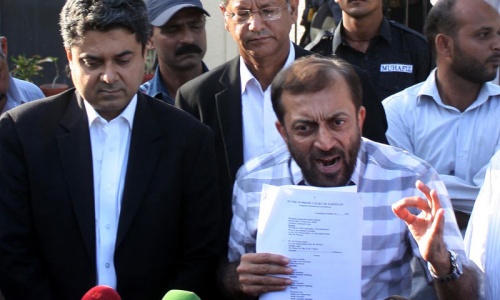ISLAMABAD: The Supreme Court on Tuesday restrained the Sindh government from undertaking in the province fresh projects that fall within the domain of the elected local government, without prior consultation and consent of the latter.
On the last day of his tenure, Chief Justice of Pakistan Gulzar Ahmed, while heading a three-judge bench, announced the judgement in the open court emphasising that Article 140A of the Constitution casts a mandatory obligation on the provinces to establish a local government (LG) possessing meaningful authority and responsibility in the political arena, and administrative and financial matters.
The judgement came on an appeal filed by the Muttahida Qaumi Movement-Pakistan seeking empowerment and autonomy for LG institutions in Sindh. The MQM-P had moved the Supreme Court to revert the municipal control of Karachi back to the mayor.
Orders local bodies be given their share from divisible pool
The apex court also ordered the Sindh government to ensure that all local governments in the province get their share from funds in the divisible pool by implementing the Provincial Financial Commission Award and that no arrears are accumulated in this regard, and if there is any, the same be released.
Likewise, Sections 74 and 75(1) of the Sindh Local Government Act 2013 were declared to be against the principle enshrined in the Objectives Resolution and the fundamental rights enacted in Articles 9, 14 and 25 of the Constitution and, therefore, also contrary to and in direct conflict with Article 140A of the Constitution, and thus declared ultra vires and struck down, the judgement said.
These sections of the LG Act provide excessive delegation of powers to the provincial government in matters relating to management and control of LG institutions.
The judgement noted that presently the elected local bodies were not in existence in Sindh and the provincial government through its agencies was performing their duties and functions.
However, the court allowed the provincial government to carry out initiation, approval and execution of any of the duties and functions of the local government in the absence of elected local bodies in Sindh.
The judgement said the powers in relation to the master plan and spatial planning, which historically belongs to the elected local government, have been superimposed with similar functions vesting in the provincial laws.
“To the extent of conflict in the exercise of their respective powers and functions by the elected local government and the statutory authorities or on account of legal provisions having overriding effect, Article 140A confers primacy upon the authority vesting in an elected local government over the powers conferred by the law on the provincial government or agency.
“Notwithstanding these, the provincial government in any case is under a duty to establish harmonious working relationship with an elected local government wherein respect is accorded to the views and decisions of the latter,” the judgement observed.
“Thus, the laws made by the provincial government i.e. the Sindh Building Control Ordinance 1979, KDA Order No.5 of 1957 Malir Development Authority Act 1993, Lyari Development Authority Act 1993, Karachi Water and Sewerage Board Act 1996, Hyderabad Development Authority Act 1976, Sehwan Development Authority Act 1993, Larkana Development Authority Act 1994, any dispensation pertaining to the Board of Revenue or the Master Plan Department or any other Development Authority in the province of Sindh and the Sindh Mass Transit Authority Act 2014, the Sindh Food Authority Act 2016, the Sindh Environmental Protection Agency Act 2014, purporting to override and conflicting action taken by the elected local government are held to be against the scheme of the constitution and the provincial government is directed to bring all those laws in accord with the mandate of Article 140A of the Constitution,” the judgement held.
The verdict emphasised that the local government is the third tier of the government as provided by the Constitution and, being government at grassroots level, has direct impact on the citizens in their day-to-day living like right to adequate and safe drinking water, right to have neat, clean and healthy environment, free from all sorts of garbage and sewage piling on the roads, streets and open spaces, keeping citizens safe from flood devastation and other natural calamities, fire, making provisions for medical treatment without any discrimination, giving equal opportunity to all citizens without discrimination of employment in service on merit basis, protecting life and liberty of all citizens without any discrimination, making provisions for adequate education in schools and colleges with competent teaching staff, provision of sports, local public transport, playgrounds, parks, mosques, graveyard, libraries, etc.
“These are some of the basic ingredients of the fundamental rights provided to be enjoyed by the citizens,” the judgement said.
Published in Dawn, February 2nd, 2022












































Dear visitor, the comments section is undergoing an overhaul and will return soon.